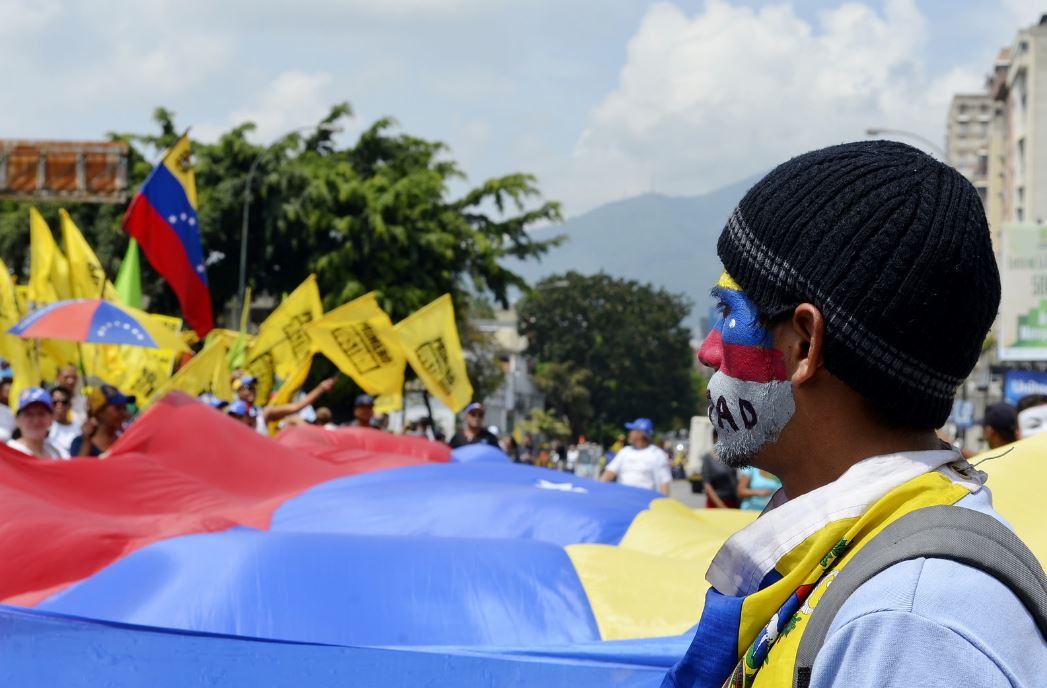by STEVE ELLNER & LUCAS KOERNER
 An opposition protest in Caracas, Venezuela in 2014 PHOTO/Carlos Díaz/Flickr/Jacobin
An opposition protest in Caracas, Venezuela in 2014 PHOTO/Carlos Díaz/Flickr/Jacobin
Distinguished Venezuelan history and politics professor Steve Ellner visited Caracas from September 26 to October 7 to teach an intensive seminar at the Venezuelan Planning School, titled “The Role of the Venezuelan State in the Transition to Socialism”. VA sat down with the long time Universidad de Oriente professor to discuss a range of pressing issues facing Venezuela, including the country’s current economic crisis, the recall referendum, and the future of the Bolivarian process.
To begin, I want to get your reading of the current political conjuncture in Venezuela.
In spite of the very pressing economic difficulties that translate themselves into transformation in people’s loyalties – some have become disillusioned, others who have supported the process have become apathetic, and still others have gone from the Chavista camp to that of the opposition – nevertheless, there are certain aspects of the situation in Venezuela that may be encouraging and provide room for guarded optimism.
One is that the opposition’s efforts to penetrate the barrios and to get support of barrio residents for their mobilizations have not been successful up until now. That was certainly the case during the guarimba protests in 2014, when the opposition obviously hoped that the protests, both the civil disobedience as well as the violent protests and mobilizations in areas controlled by the opposition, would spread to poorer, traditionally Chavista sectors. In the eastern part of Caracas, in Lechería as opposed to Barcelona-Puerto La Cruz, in Puerto Ordaz as opposed to San Felix, and in other opposition-controlled municipalities throughout the country, those protests flourished but didn’t spread to the barrios. And now in 2016, the same thing has happened. The opposition has not been successful in mobilizing people in the barrios.
That’s not to say that people in the barrios are overwhelmingly supportive of the government. But it’s one thing to say that they’re disappointed with regards to the situation, and it’s another to say their disappointment has reached a degree in which they enthusiastically support the opposition parties and are willing to participate in their mobilizations. Don’t forget that at the time of the collapse of the Soviet Union in 1991, the miners participated in protests against the government which contributed to its downfall. So it’s one thing that you’re disappointed, it’s one thing you’ve become somewhat disillusioned, or you’ve got second doubts. It’s another that that this disappointment transforms itself into the kind of anger or desperation that expresses itself in the form of participation in anti-government mobilizations and protests.
The opposition has attempted to politicize people in the long lines outside supermarkets. They went there and started talking politics, hoping that the people in the line would actively respond, in which case anything could have happened. And yet, even though people are naturally upset and may express that in the lines, it’s not turning into the kind of scenario that the opposition was anticipating and hoping for.
You are, however, seeing increasing levels of social discontent– though not necessarily politicized discontent– being vented in the form of lootings, etc. due to the intensity of the crisis, as in the “Cumanazo” riots earlier this year that saw police arrest over 400 and that shut down the eastern coastal city for two days.
What I have just said refers to the situation up until now. I’m not making predictions with regard to what might happen. The situation here in Venezuela is very difficult for everybody. If it’s difficult for us university professors, it’s much more difficult for the people in the popular sectors of the population. It’s true that the situation may at some point escape from the hands of the authorities, but at least up until now that has not happened in a big way. This is a reality that counters the idea that everything has been lost and that Venezuela is in a humanitarian crisis, an allegation which is a tremendous exaggeration, as bad as things may be.
Venezuela Analysis for more
